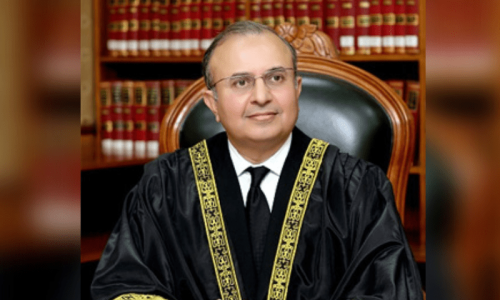ISLAMABAD, June 29: PPP co-chairman Asif Ali Zardari has called for viable peace in Kashmir and said that India-Pakistan relations should be ‘creatively re-discovered’.
According to a press release issued by the PPP media centre on Sunday, he said in a statement at an international conference in London on “India and Pakistan-Designing a New Future” that Pakistan supported an autonomous Kashmir running much of its own affairs.
Mr Zardari said the PPP welcomed the India-Pakistan dialogue undertaken some years ago to open borders, trade and travel.
He said the PPP did not reject the peace process because “the future happiness of the people of South Asia was too important to be lost in an internal political battle in Pakistan”.
“The coalition partners in Pakistan had signed a charter of democracy that commits both our parties to friendship and peace with India.”
He said that Pakistan and India had nearly come to war in 1999 in Siachen and there was a serious threat to peace from militants and terrorists.
He said the PPP welcomed as a positive step forward the decision by India and Pakistan to cooperate in anti-terrorism efforts and to share information in this regard.
He said the challenge was to deal with militants and extremists so that they could not hold foreign policies of the two countries hostage to their acts of terrorism.
He said that curbing terrorism in tribal areas was a priority for the people of Pakistan and the government.
He said the PPP had been consistent in advocating that peace and stability was critical to the wellbeing of the over one billion people of the region.
During the tenures of the PPP in office, “our people and armies did not face a Kargil-like situation”.
The Simla Agreement was signed by Indira Gandhi and Zulfikar Ali Bhutto in 1972 and prime minister Benazir Bhutto worked with her Indian counterpart Rajiv Gandhi to build on the spirit of Simla.
“The agreement not to attack each other’s nuclear installations was one landmark agreement signed in 1988,” he said.
At the Saarc summit in Islamabad in 1988, the PPP government proposed Saarc’s transformation from a cultural organisation into an economic grouping. As a result, the South Asian Preferential Tariff Agreement was born.
He said there were several ways to strengthen relations. One important way is through economic integration and trade, business cooperation, media exchanges, transportation links, sports and entertainment events, cooperation in information technologies and peaceful uses of nuclear energy in medicine, education and agriculture.
He said the PPP government also agreed to build pipelines for oil and gas to be pumped across Pakistan to India.











































Dear visitor, the comments section is undergoing an overhaul and will return soon.